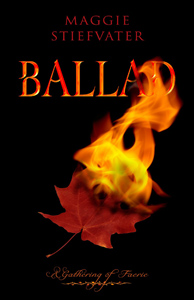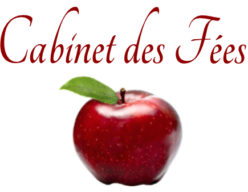Ballad
by Maggie Stiefvater, 2009
Reviewed by Donna Quattrone
 Fairies are tricksy creatures. Their connection to the human world is tentative and their interactions are rarely reciprocal or free from barely disguised whimsy. They are often drawn to beauty and those who shape it ‘” poets, painters, dreamers and, of course, those who compose otherworldly music. But is gaining their attention always a good thing?
Fairies are tricksy creatures. Their connection to the human world is tentative and their interactions are rarely reciprocal or free from barely disguised whimsy. They are often drawn to beauty and those who shape it ‘” poets, painters, dreamers and, of course, those who compose otherworldly music. But is gaining their attention always a good thing?
Ballad is a book that’s peopled by a piper, a muse, an unlikely mentor and a full assortment of fey. The combination makes for much intrigue, but it is also a tale about recognition and transformation, a story ripe with humor, heartbreak, and extreme fairy politics.
At the forefront of everything is James, piper extraordinaire, a young man with a charmingly flip sense of bravado, a never-ending repertoire of off the cuff remarks and a decided case of unrequited love. As if that weren’t enough, James also has visions, and a compulsion to follow an antlered being that sings of the dead.
And then there’s Nuala, a solitary fey with a penchant for seduction and a particular hunger for exceptionally talented male musicians. Nuala has a number of remarkable talents herself, but is bound by mythic constraints that serve to lend both tension and poignancy to the narrative as it unfolds.
The tale takes place in and around Thornking-Ash, a high school comprised of gifted musicians and professors who are much more than they seem. During their first year studying at this school, James and Dee (the harp prodigy from Lament) discover that dorm life is not all it’s cracked up to be, that distractions can rapidly go from daunting to dangerous and that particular talents sometimes can become very complicated, indeed.
Stiefvater has created the perfect setting in which to explore the “music attracts fairies” motif. Ballad resonates with music’s infinite capacity to haunt the soul and, in this particular case, the spell it casts over both fey and human alike is a powerful one. The alchemical mix of music and magic is intrinsic to the plot, and it weaves an almost mesmerizing counter harmony to the relationship that develops between Nuala and James. Classic fairy lore is creatively intertwined with contemporary culture, and the blend results in a book that sings a notably enchanting tune that will  linger long after the last page is turned.

